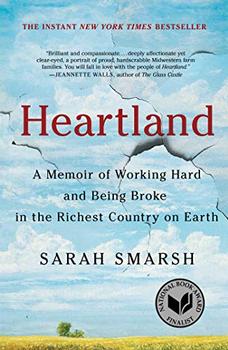Summary | Excerpt | Reading Guide | Reviews | Beyond the Book | Readalikes | Genres & Themes | Author Bio

A Memoir of Working Hard and Being Broke in the Richest Country on Earth
by Sarah Smarsh
Sometimes it's a worthwhile gamble for the poor to drift. Having no money looks and feels different in different places. Are your neighbors helpful? Is the landlord raising the rent? Can you walk to work if the car goes out? For a child, are the kids and teachers at school welcoming? Do you have to walk past a drug house to get there? Among the poor, the potential risks of starting over are more severe for women, people of color, and other disadvantaged groups. But often, by moving, there is little to lose and at least a chance at finding something better.
People without money today might be less transient, for a lot of socioeconomic reasons. But when Betty left Wichita in 1963, she could just about count on finding a job and a cheap apartment wherever she went, so long as she had the will to work for it. And Betty had will in spades.
Chicago was the biggest place she had ever seen, but she was unimpressed. "The Windy City," she told me, skeptical as one who was raised in Tornado Alley. "Shit. They never seen wind."
The day she arrived, she found an apartment for $20 a week. The same place might have cost half as much in Wichita, but there was a lot of work to be found in Chicago. The next day, she bought a newspaper and answered an ad for a job at a factory that made clock radios and other electronics.
She got the job and thought it paid well. She was used to earning the federal minimum wage of $1.15. The factory paid three times as much. Her landlady, a Puerto Rican woman Betty befriended despite their language barrier, babysat Jeannie all day while Betty sat on a stool at work drilling three screws into blocks of wood, over and over, and at night while she worked at the deli down the road.
She didn't care to find a new crowd to party with. Back home, she'd done speed with Ray because everyone else did, but she didn't like it. Now Betty was seventeen and alone with a baby. Her entertainment was to push Jeannie in a stroller next to Lake Michigan. She couldn't afford to see a movie, but she visited the Chicago Natural History Museum, which must have had free admission.
Each month, after she paid the rent and utilities, and the landlady for watching Jeannie, Betty had $27 left. She budgeted some of it for cigarettes and gas. The rest went to groceries from the little store around the corner. The store sold frozen pot pies, five for a dollar. She'd buy twenty-five of them, beef and chicken flavor, and that would be her dinner all month. Every day, a candy bar for lunch at work and a frozen pot pie for dinner at home.
After winter passed, she left the factory for a filing job at a life insurance company closer to her apartment. She could walk to the office, then from the office to her job at the deli, then from the deli to home. She even had a stint at a chocolate factory, picking candy off the conveyor belt, just like in the I Love Lucy episode.
Once Betty came home from work and saw a skinny kid crawling out her apartment window onto the fire escape. She chased him up the metal ladder and across the roof, where she tripped and blackened the knees of her pedal pushers, which really pissed her off, especially since she had already dropped her cigarette. She followed him down a dirty hallway and beat on a door until a big woman with black hair opened it.
Betty told her what had happened. The woman dragged the boy to the door and yelled at him in Spanish. He dug in his pockets to hand Betty the costume jewelry he had taken. The woman was giving him a beating before she even closed the door. Betty felt bad for the kid. But she had her jewelry back.
Back in Kansas, according to Betty many years later, Ray had gone AWOL from the Army. He figured out where Betty lived, most likely from her mom. He showed up in Chicago saying he wanted to start over. Betty knew he would be trouble again. But she was scared of him, and she let him in.
Excerpted from Heartland by Sarah Smarsh. Copyright © 2018 by Sarah Smarsh. Excerpted by permission of Scribner. All rights reserved. No part of this excerpt may be reproduced or reprinted without permission in writing from the publisher.
Your guide toexceptional books
BookBrowse seeks out and recommends the best in contemporary fiction and nonfiction—books that not only engage and entertain but also deepen our understanding of ourselves and the world around us.